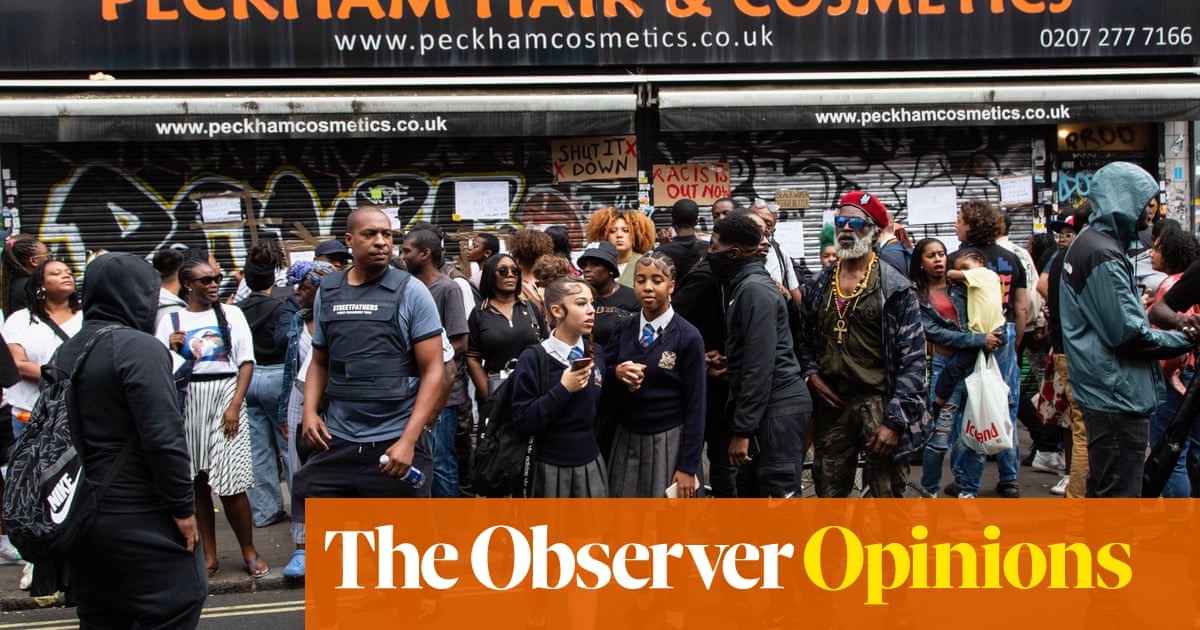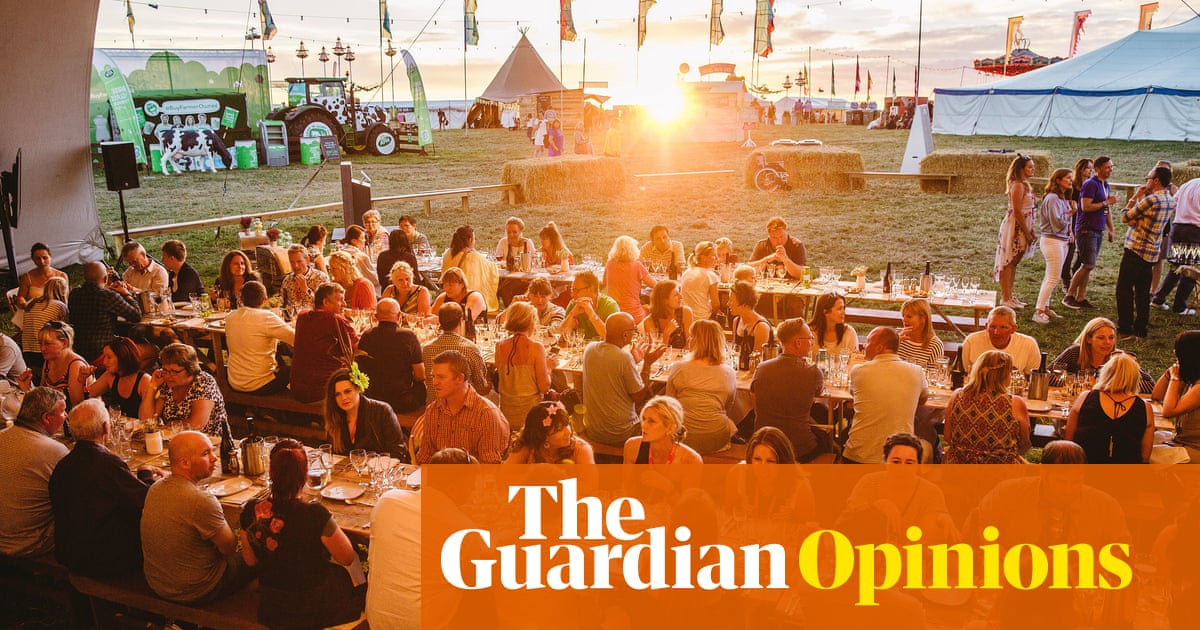
Peter Kinsella
Owner, Lunya restaurant and deli, Liverpool
“It was strangely unemotional looking through the windows,” says Peter Kinsella, but within minutes tears begin to fill his eyes.
We are in Manchester’s Barton Arcade, opposite the now closed branch of Lunya, Kinsella’s Spanish deli and restaurant. “Our sign put up in March saying we’ll be closed for a short period is still in the window,” notes the 56-year-old. He points out one wall and recalls how, in 2015, when opening Lunya Manchester, agreeing the right shade of staining took days. “It doesn’t matter at all, but at the time it was so significant.”
Kinsella’s voice cracks, not for the last time, remembering how one June night this year, at 10pm, after repeatedly putting the Zoom call off, he had to tell more than 30 Manchester employees they had lost their jobs. “That was just really hard. Knowing they’re not going to find another quickly. I only know three who have. People were shocked.”
Kinsella has two other branches of Lunya in his hometown of Liverpool. Like many restaurants, the business was under financial pressure even before the pandemic. After Brexit, for example: “The exchange rate dropped from €1.47 to €1.08, and costs went up 30%. We import 90% of what we sell.” But the Manchester branch was popular: “We still get emails from people sad and angry we closed.”
What Manchester lacked was the strong deli trade which at Lunya’s primary Liverpool site – opened in 2010, now on Hanover Street – grew rapidly during the first lockdown and remains robust. In-store and online delivery revenue of £10,000 a week and more enabled Lunya’s two Liverpool restaurants, restricted to 45% of normal seating capacity between lockdowns, to continue operating at a modest loss. “Our calculations were Manchester would lose £14,000 to £17,000 a week, which would have collapsed the company,” says Kinsella, in his gentle Scouse burr. “It felt like you’ve got three kids and a lifeboat for two, deciding which you cast adrift.”
The situation in Liverpool is still fragile. After a busy summer, tier 3 and single-household dining was “disastrous”. On one October Monday, Lunyalita Albert Dock, which opened in July 2018, took just £162. Its wage bill that day was £450. In that dire context, Kinsella describes the second full lockdown and its attendant financial support as a relief. But he is “profoundly angry” it did not happen sooner. Restaurants now face “closure or profound restrictions in the run-up to Christmas. It’s devastating for our industry.”
Even with Lunya’s back rent (in October, about £180,000) and loan repayments deferred, money is tight. Strong online retail Christmas sales will hopefully sustain the business until spring, a lifeline other restaurants lack, but, says Kinsella: “We can still easily go under.”
If Lunya does survive it may, to some extent, be down to a letter Kinsella wrote in March. Facing lockdown, on the morning of Wednesday 18 March a group of Liverpool restaurateurs met in the Baltic Triangle area of the city, ostensibly to discuss practicalities. “Things like flushing your water pipes with chlorine then turning the supply off. We had five minutes of that and two hours of everyone being really scared,” remembers Kinsella. “I walked back in the rain streaming with tears, thinking, ‘It’s gone.’ It was a combination of fear and absolute anger.”
That anger stemmed from the fact that, at the time, the government was expecting restaurant owners to use personally guaranteed loans to cover bills, to risk their own homes to protect the banks and pay landlords.
Back at Lunya, Kinsella bashed out a howl of outrage and posted it on Twitter. Retweeted almost 7,500 times since, his letter addressed not just business but the shame Kinsella felt that he was too busy saving Lunya to focus on his elderly parents or even his wife and Lunya co-founder, Elaine, then beginning treatment for thyroid cancer. “Normally, you’d stop everything and concentrate on that. But for us it was a bit part. We were terrified. But it was two battles of survival, for Elaine and the business.”
That afternoon, the Labour MP for Wirral South, Alison McGovern, confronted the chancellor, Rishi Sunak, with Kinsella’s letter in the Treasury select committee. Shortly after, the government stepped in with support. Furlough was welcome, as was access to government-guaranteed bounce-back loans and the VAT cut, but as of October Lunya had received only £39,000 in direct funding. Without its online sales, Lunya would not have survived.
Kinsella is proud of that pivot. Remodelling as a mail-order business has been difficult but what that new resilience means is moot: “I’m optimistic we can survive. But optimism’s different to confidence. Confidence is optimism with data and we don’t have that. It’s all projection.”
A management consultant in adult social care for 24 years before he fell in love with Spanish food and launched Lunya, Kinsella has been living the foodie dream for the past decade: searching out suppliers across Spain (“I speak Spanish like Borat speaks English”), and flying back to Lunya with his bags stuffed with percebes or tomato rosa (“big, ugly pink-green things, but stunning”) from Barbastro to stick on that night’s specials. Will that ever be feasible again?
The stress ebbs and flows. As does Kinsella’s handle on the fact that his plan of retiring in a few years is now “fantasy”. “It’s time to cut back. But at the moment I’m not arsed. We’ve really reassessed.” He is cycling more. He bought a puppy. Thankfully, Elaine is recovering.
Processing all this will take years. For now, Kinsella is “energised” and adjusting. “I’m missing Spain,” he concedes. “But, right now, my favourite day would be doing nothing but carving ham and nattering to people.” Like many of us, Kinsella is trying to find peace where he can, one day at a time.
Melissa Thompson
Founder, Fowl Mouths food and recipe project, London
In the immediate aftermath of the killing of George Floyd, Melissa Thompson was crying all the time. “I was emotional and angry. I felt my head was going to explode. I wanted to scream. People were like, ‘This is really bad’, and I was like, we’ve been trying to tell you this for how long?
“The Black Lives Matter movement is, basically, happening because white people are allowing it. Whereas before they just shut down to it. That pisses me off. We have to be ‘grateful’ to be given the space to discuss this. It should have happened ages ago.”
That burning frustration explains why an incident of police brutality in the US has become a global examination of every facet of racism. Floyd’s death was like the point of impact on a shattered windscreen, a deep impression from which you could follow faultlines into every area of society: sport, education, fashion, music or, in Thompson’s case, food.
On 30 May, the Evening Standard published the video Rhyme for London’s Restaurants. Created by a PR firm, this eight-minute celebration of the capital’s locked-down food scene, recited by its most famous faces, was released to raise money for two charity campaigns, the Standard’s Food For London Now and Hospitality Action’s Covid-19 emergency relief grant. As a London foodie, previously host of the supper club Fowl Mouths and now a development chef, Thompson clicked through expecting the video to, as she later wrote, “conjure up memories of a world that right now seems like a distant dream”.
Instead, she was appalled. Of 64 featured talking heads, just one, the Standard food critic Jimi Famurewa, was black. In multicultural London, in a film supposedly hymning the “diversity” of the capital’s food scene, well over 50 of the featured faces were white. A journalist before she moved into food, Thompson called this out on Twitter, and after contact from the politically engaged food newsletter Vittles found herself writing the widely shared essay Black Erasure in the British Food Industry.
In the era of Windrush and Grenfell, arguing about representation in a charity video could seem trivial. But by tracking the absence of black food and faces in the media (the lack of visible black chefs and recipe writers; how few black-owned restaurants are reviewed by national critics; patronising treatment of African and Caribbean dishes), Thompson sought to illustrate how “it’s all part of the same problem”.
“Obviously, a black man being murdered by racist police is one thing, but the constant erasure of black voices, faces and culture feeds into the same thing – to completely dehumanise black people. Problems don’t occur in a vacuum and it won’t get better until white people are as attuned to [that] as black people.”
Part of that learning process is acknowledging why food is such a flashpoint. It is an intimate part of childhood, family and cultural history. Arguably, how we eat defines who we are.
“To come in and obliterate that is disrespectful,” says Thompson. When Marco Pierre White makes risible rice and peas or Jamie Oliver his much-mocked “jerk rice”, it is not just laughably clumsy. Given how black communities are barred from celebrating their own food publicly, it is neo-colonial in its arrogance. It is hurtful. “It creates this whole false narrative,” says Thompson. “That’s why people get upset.”
Thompson does not want chefs to feel they have to stop cooking cuisine X or Y unless they have roots in that food. Her supper club majored in Japanese karaage fried chicken, which she discovered via her Japanese sister-in-law. But, crucially, when approached to write a book on Japanese food, Thompson, raised in Dorset, declined. “In some cases, imposter syndrome is a valid alarm. I’d been to Japan, but a book? I’d want to spend months there, my knowledge to be tenfold. I don’t think everyone considers that. It’s about respect. Fuchsia Dunlop does it well. She’s heavily immersed in the food culture she profits from. But we don’t see that all the time.”
The daughter of Maltese and Jamaican parents, Thompson, now 39, grew up in “really, really white” Weymouth. She “never spoke about being black”. Both personally and professionally “I never wanted my race to define me. But this year I learned that from the moment I was born I’ve never had a choice in that. It’s crystallised a lot.”
Thompson describes herself as a “reluctant campaigner”. But as she sees fit, and despite some vile online abuse, she is embracing the opportunities that the Vittles essay has opened up to speak out. She is writing an outspoken column celebrating black talent for BBC Good Food magazine, speaking at public events on issues around black culture and food, and undertaking corporate educational work.
These are “tentative steps in the right direction”. Discussion and action often take place online or mainly in London. Outside that “bubble”, Thompson is wary of complacency.
“A lot of work is needed. I’m still seeing spaces where there just aren’t black voices – and it’s not about having one black voice it’s about having several. And not limiting people. I’m an optimist. And I’m often disappointed.”
The active foregrounding of black chefs in professional kitchens, on TV and radio, which Thompson advocates – as a matter of justice but also to “enrich” food culture (“The food media can get so inward-looking and boring”) – will require white chefs to step back and let others lead. How many of them will willingly make that financial sacrifice?
That change must go right down to street-food level, too. “I’ve got friends,” says Thompson, “who apply for food markets and get told, ‘Nah, someone’s already doing African food.’ Africa’s 54 countries. Can you imagine being denied the opportunity to cook pasta at a food market because they’re already doing paella? It’s ridiculous.”
Josh Eggleton
Chef-owner, the Pony & Trap, Chew Magna, nr Bristol
On Wednesday 25 March, chef Josh Eggleton received a call that defined his lockdown. That night, the charity Caring In Bristol (CIB) needed hot food to feed rough sleepers newly housed in hotels and hostels. “This is 2pm,” recalls Eggleton, a fundraising friend of the charity who, last Christmas, organised chefs including Romy Gill to cook for its service users. “We’d closed our chip shops so we went there and cooked all the fish. Bang. Done. What’s next? Turns out Pasta Loco was making loads of lasagne to sell, but had closed. Right, we’ll have that. Before you know it, we’ve set up three kitchens across the city.”
Working with Pasta Loco’s Dominic Borel and the owner of Emmeline cafe, Shona Graham, the so-called Cheers Drive ran until October feeding 400 people three times a day, and still continues at a smaller scale. The owner of seven Bristol food businesses, including the Michelin-starred country pub the Pony & Trap, 37-year-old Eggleton is a busy man – constantly racing around Somerset in his van, doing interviews in laybys, struggling for phone signal. He could have easily knocked back CIB. But he didn’t. “I just feel it,” he says, trying to articulate his motivation. “I want to help, to feed people. I enjoy problems like that.”
In early November, as England entered a second lockdown, Eggleton again ramped up his food aid work. “I’ve been sucking up leftover stock from my restaurants and others,” he explained, so that his kitchens – at the same time as producing retail takeaway meals and veg boxes – could make a planned 700 meals a week for CIB and other community groups until December. He accepts lockdown, despite the disruption to his business: “We need to protect lives.”
That attitude and energy explains why, this year, Eggleton has emerged as a key agitator-facilitator among those in Bristol who want the hospitality industry to use its skills and profits to address food inequality. “Covid has exposed a broken system,” says Eggleton. “I want to make food as accessible as possible, and it’s about me understanding how I make that work. The more I do, the more bloody hair-brained schemes I come up with.”
Beyond Cheers Drive, this summer Eggleton co-founded the food aid and small business coalition, Bristol Food Union; finalised plans for Food Tank, a cookery school that will feed community groups; and launched Covid-workaround, Breaking Bread. This outdoor food and booze complex is run cooperatively by several Bristol businesses and donates 2% of turnover to charitable projects. “That’s more profit than we’re making,” laughs Eggleton, ruefully. “It’s an expensive operation. But we put it together in 10 days.”
Next year promises to be even more radical. In spring 2021, Eggleton will reopen the Pony & Trap under a new name as a community interest company, offering baking, foraging and fermentation courses. People will be able to volunteer in its gardens in return for lunch and a veg box, and a set number of people interested in but unable to afford what Eggleton insists will be “some really refined gastronomy” will be invited to eat for free at one of three weekly communal dinners.
“It’s a Robin Hood thing,” says Eggleton. “We’re going to charge the rich and give it back to people who need it. That’s the way the world should work: redistribution of wealth.
“Dining won’t be a simple transaction of ‘pay us loads of money and we bend over backwards’,” he continues. “That’s the old way. I want my staff to enjoy it. It’ll be like coming to my house. The kitchen will be integrated into the restaurant and people can walk in and watch me. I’m not coming to the table to dress the plate. Pick your plate up and watch me take apart this turbot. Invest in me. I’ll invest in you.”
This food foundation (complete with podcast and YouTube channel) was always a long-term plan, but lockdown finally gave Eggleton the time to formulate it. “Other chefs think I’m insane, tearing down a restaurant I spent 15 years building. But that excites me.” Far more so than potentially losing that Michelin star: “I’m not worried. If I can help heal and inspire people through food, that’s my objective now.” The Pony’s name will live on, incidentally, at an imminent “open-plan Pony bistro” in a warehouse next door to the brewery and tap room, Bristol Beer Factory.
This former Gordon Ramsay Scholar (“essentially I won a cooking competition and did some stages”) insists he was never the typical, hyper-ambitious fine-dining chef. He loved cooking, the allure of the kitchen and, aged 19, was banging on restaurant doors in New York getting told to “fuck off”. But his time in high-end food was short.
Eggleton took on the Pony & Trap at 22, not because he thought he was a fantastic chef – he was knocking out lasagne and chips, pork chop with stilton sauce, a ploughman’s – but because he wanted to be his own boss. “Then we started experimenting, reading, refining. How do you make black pudding? How’s mustard made? What’s a lemon posset?”
He relished the long hours. Always has done. In his teens, on Saturdays Eggleton would work from 6am to 11pm in chip shops, and sell match-day programmes at Bristol Rovers in between. That “almost addiction” to work and his inquisitive thirst for challenges perhaps explains his recent choices as much as any campaigning zeal.
If Eggleton operates at 100mph, he is adamant it is not at the expense of business detail at his venues. He is in constant meetings, phone pinging with sales reports. He has strong senior staff around him, most of them Pony & Trap graduates, who, he says (this being “boho Bristol”) embrace his ideas on food equality.
But even in boho Bristol business is business. Eggleton’s 150 staff need protecting. In February, before the grand Pony reset, Eggleton will open a second pub, the Queen’s Arms, in Chew Magna, serving sharp pub grub and Sunday roasts. It too is crucial: “It’s always tight. The margins in this industry are screwed. But I have to make it work.”












